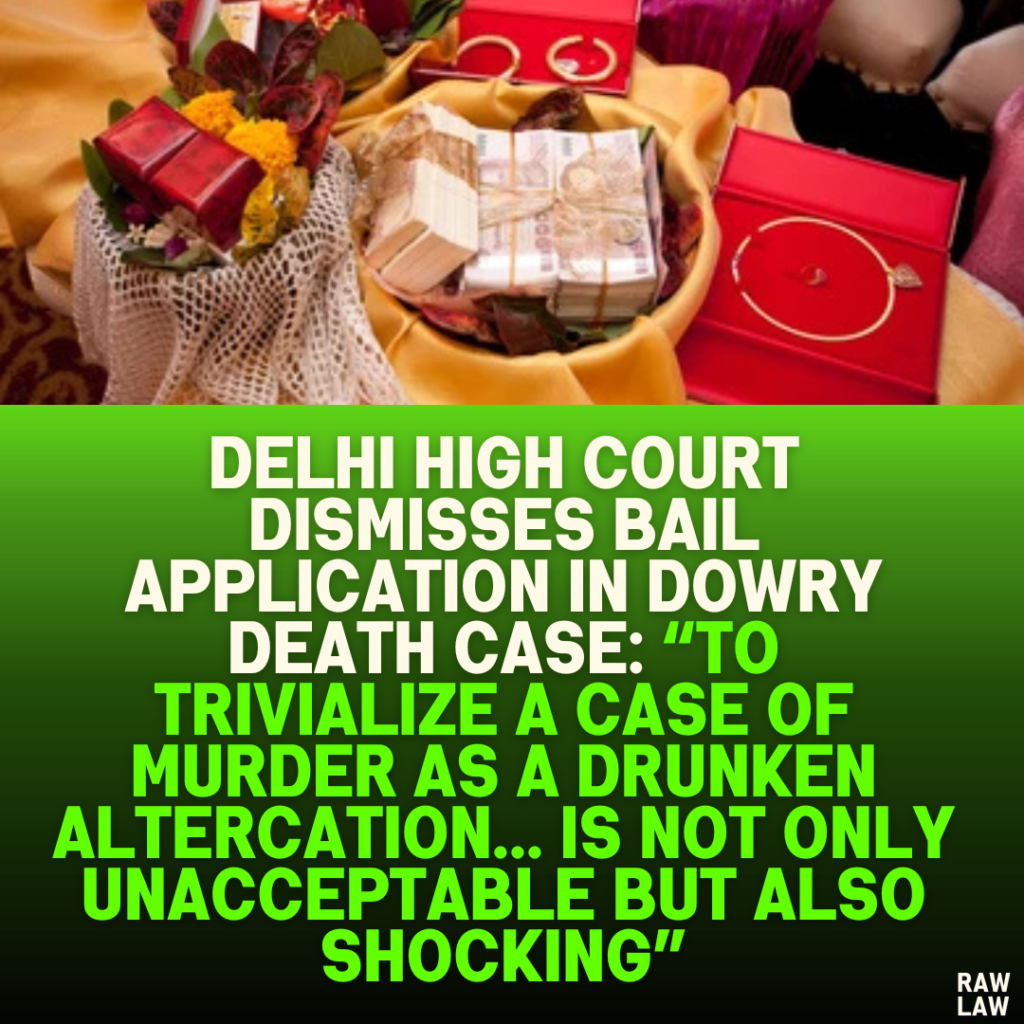Court’s Decision
The Delhi High Court dismissed the bail application filed by the accused husband in a dowry death case. The court concluded that the brutality of the crime, the overwhelming evidence, and the seriousness of the allegations justified the rejection of bail. Justice Swarana Kanta Sharma emphasized that the gravity of the offense demanded a strict approach to bail, stating, “To trivialize a case of murder… is not only unacceptable but also shocking.”
The court underscored that decisions in such cases also serve as a societal message, highlighting the judiciary’s role in deterring dowry-related violence.
Facts
- The victim married the accused in April 2021.
- On June 17, 2021, the victim was found dead at her residence in Delhi. The maternal uncle of the victim reported the death to the police, alleging that the accused had murdered her over unmet dowry demands.
- The post-mortem report revealed 33 ante-mortem injuries, including injuries from manual strangulation, smothering, and blunt force trauma.
- The victim’s family alleged that the accused and his parents persistently harassed the victim for dowry. Statements recorded under Section 161 of the Cr.P.C. highlighted repeated threats and demands for dowry.
- On the day of the incident, the victim and the accused had returned from her parental home, where the accused had demanded her father sell land to fulfill his monetary demands.
- The accused fled the scene after the victim’s death but was arrested on June 18, 2021, and has been in judicial custody since.
Issues
- Whether the accused is entitled to bail despite being charged with murder and dowry-related harassment.
- Whether the alleged dowry demands and harassment constitute sufficient grounds to deny bail.
Petitioner’s Arguments
The accused’s counsel presented the following points in favor of granting bail:
- The accused has been in judicial custody for over three years, and bail is the norm in most cases.
- The co-accused persons (presumably the accused’s family) have already been granted bail.
- The prosecution’s case has inconsistencies, particularly in witness statements.
- The accused argued that the death occurred during a drunken altercation, asserting it was not a premeditated act but an impulsive reaction.
Respondent’s Arguments
The prosecution strongly opposed the bail application, stating:
- There are no material contradictions in the witness statements.
- The post-mortem report corroborates the prosecution’s case, revealing deliberate and brutal acts leading to the victim’s death.
- Statements from the victim’s family show consistent harassment and abuse related to dowry demands.
- The accused’s admission of committing the crime undermines his defense of unintentional killing.
Analysis of the Law
The court analyzed the following legal principles and statutory provisions:
- Section 302 IPC: Penalizing murder.
- Section 304B IPC: Addressing dowry deaths, especially when they occur within seven years of marriage under suspicious circumstances.
- Section 498A IPC: Penalizing cruelty against women by their husbands or relatives.
The court highlighted the legislative intent behind Section 304B IPC, enacted to combat the persistent societal problem of dowry-related violence.
Precedent Analysis
While no specific past judgments were cited, the court relied on the general principle that bail should not be granted lightly in heinous crimes, especially when there is prima facie evidence of serious offenses such as murder and dowry death.
Court’s Reasoning
The court provided a detailed rationale for rejecting the bail application:
- Severity of the Crime: The post-mortem report, which listed 33 injuries and evidence of strangulation and smothering, indicated deliberate brutality.
- Dowry Demands as a Motive: Witness statements and circumstantial evidence suggested that the accused was harassing the victim and her family for dowry.
- Defensive Arguments by the Accused: The court found the argument of a “drunken altercation” unpersuasive and shocking, especially given the accused’s role as the victim’s husband.
- Social Implications: The court emphasized that leniency in such cases could embolden perpetrators of dowry-related crimes, contradicting the spirit of Section 304B IPC.
The court stated: “The victim, being his wife, could not have thought that the person she had been married to, will kill her brutally after consuming liquor, just because her parents did not agree to sell their land.”
Conclusion
The court dismissed the bail application, stating that the gravity of the offense, coupled with the evidence on record, left no room for granting bail at this stage. It reiterated that the judiciary must act as a deterrent in cases involving heinous crimes like dowry deaths.
Implications
This ruling underscores the judiciary’s commitment to addressing dowry-related violence and sending a strong societal message. The decision reinforces the idea that brutal crimes, particularly those targeting vulnerable individuals, will be met with stringent judicial scrutiny.
